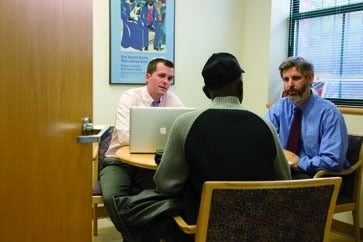The Board of Veterans’ Appeals of the U.S. Department of Veterans Affairs denies a soldier’s claim for disability benefits for an injury that occurred while he was on active duty. But the decision is handed down while the soldier is redeployed to Afghanistan, and he doesn’t realize he has the right to appeal until after he returns stateside—after the appeal deadline has passed.
For students in HLS’s new Veterans Legal Clinic, the chance to work on this case and others like it is eye-opening.
“As law students, we like to think of law as this just machine that works properly, but when you’re introduced to a case like this, it blows your mind,” says Abigail Dwyer Maltz ’13, who interviewed the client and his wife, and, with another clinic student, drafted a 20-page brief on his behalf.
The Department of Veterans Affairs has a backlog of 600,000 benefits cases.
With a huge increase in recent years in the number of combat veterans, and with an aging veteran population in declining health, the unmet legal needs of veterans are proliferating. The Department of Veterans Affairs has a backlog of 600,000 benefits cases, according to The New York Times, with veterans waiting an average of 273 days before receiving disability and other benefits, and far longer if they’re applying for the first time. The VA system is complicated, and for low-income veterans especially, getting legal aid is challenging
HLS launched the Veterans Legal Clinic last fall, under the leadership of Clinical Professor Daniel Nagin, to address this growing need. Nagin, the new director of community-based lawyering at the WilmerHale Legal Services Center in Jamaica Plain, joined HLS in June 2012 from the University of Virginia School of Law, where he had founded the Family Resource Clinic to do public benefits litigation. In joining HLS, he proposed a Veterans Legal Clinic as part of the Legal Services Center. Dean Martha Minow, a strong supporter of veterans, quickly agreed.
The clinic’s first group of students enrolled in the clinic last fall. Students have already worked on a variety of cases for veterans and their family members. In addition to benefits cases at all levels of the process—from VA regional offices to the U.S. Court of Appeals for Veterans Claims—they have also tackled discharge upgrades, correction of military records cases, access to health care, financial assistance and other necessities.
One student successfully represented a homeless veteran in an appeal hearing before the Massachusetts Department of Veterans’ Services that overturned a denial of financial assistance. Other students have tackled problems from pursuing an appeal for a client whose VA pension was wrongfully terminated to representing a veteran at the Court of Appeals for Veterans Claims in an appeal for an increased disability rating.
Nagin was interested in creating the clinic, in part, because there are so few lawyers serving veterans.
Nagin was interested in creating the clinic, in part, because there are so few lawyers serving this population. He had also seen up close the struggles a family member faced with the VA: After serving in Iraq, his brother-in-law lived with Nagin and his family as he attempted to readjust to civilian life. “When things hit home, that’s a real wake-up call about the countless other veterans facing similar or more daunting obstacles,” Nagin says.
In addition, Nagin saw real value for law students in this type of clinical work. “These cases are very good teaching tools to expose students to legal issues that are rich and complex, not to mention the human dimension of the cases,” he says. Moreover, he adds, many of these cases involve issues related to medical and mental health diagnoses and treatment. “This gives students a great opportunity to interact with medical providers and experts, and consider the intersection of law and medicine.”
Nagin expects the scope of the clinic’s services and docket to grow over time. The clinic has already begun to assist incarcerated veterans with legal problems. Nagin and his students have made presentations to veterans confined in Boston-area jails, and taken some on as clients. And the Legal Services Center’s Estate Planning Clinic, under the leadership of Clinical Instructor Tamara Kolz Griffin ’93, is pivoting its focus so that it serves veterans and their families.
Nagin has also helped to forge a partnership with one of the nation’s top firms for veterans’ benefits, Chisholm Chisholm & Kilpatrick in Providence, R.I., to facilitate students’ participation in appeals before the Court of Appeals for Veterans Claims. Since the system is so backlogged and cases take so long to reach the court, partnering with the firm gives students the chance to handle cases there while providing clients continuity. These veterans’ cases are referred to the clinic through Chisholm Chisholm & Kilpatrick’s existing pro bono program with the Disabled American Veterans, the largest veteran service organization in the country.
Zachary M. Stolz is an attorney at the firm who is co-supervising students in two cases. “This partnership gets the students associated with a group of people that need and deserve our help,” says Stolz, a leading practitioner before the Court of Appeals for Veterans Claims, “and gives them some good experience in our federal court system.” And, he adds, “The value to our clients is they get some top-notch law students working with them and teaming up with our attorneys.”
Read other updates on Harvard Law School’s 27 clinics.
